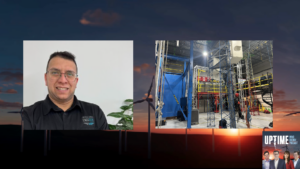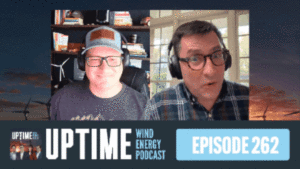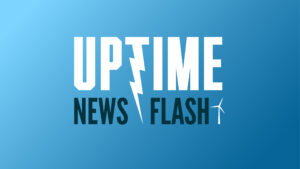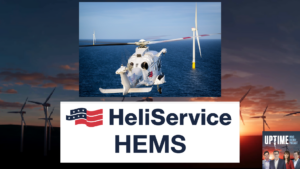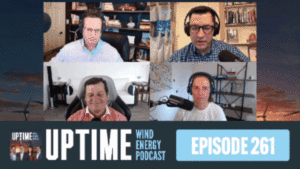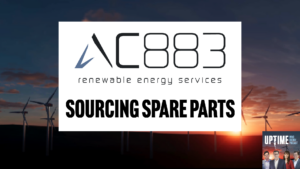Podcast: Play in new window | Download
Allen and Joel speak with Frank Martinez, Talent Acquisition Specialist and Veterans Ambassador for Pearce Renewables. With 32 years of distinguished U.S. Army service and 13 years at Pearce, Frank shares invaluable insights on creating pathways for veterans in the renewable sector. Pearce is leveraging veterans’ unique skillsets and fostering a supportive work environment, with an impressive 10% of their workforce self-identifying as veterans.
Sign up now for Uptime Tech News, our weekly email update on all things wind technology. This episode is sponsored by Weather Guard Lightning Tech. Learn more about Weather Guard’s StrikeTape Wind Turbine LPS retrofit. Follow the show on Facebook, YouTube, Twitter, Linkedin and visit Weather Guard on the web. And subscribe to Rosemary Barnes’ YouTube channel here. Have a question we can answer on the show? Email us!
Pardalote Consulting – https://www.pardaloteconsulting.com
Weather Guard Lightning Tech – www.weatherguardwind.com
Intelstor – https://www.intelstor.com
Allen Hall: Welcome to the Uptime Wind Energy Podcast. I’m your host, Allen Hall, joined by my co host, Joel Saxum. Today, we’re pleased to welcome Frank Martinez, Talent Acquisition Specialist and Veterans Ambassador for Pearce Renewables. Frank brings a unique perspective to our discussion combining 32 years of distinguished U. S. Army service with 13 years at Pearce Services. In his current role, Frank leads Pearce Renewables Efforts to recruit and train veterans for the renewable energy industry. This initiative draws on Frank’s extensive military background and his deep understanding of the renewable sector. During his military career, which included both active and reserve service, Frank trained over 40, 000 service members.
Today, Frank will share insights into Pearce Renewable’s veteran recruitment and training programs. He’ll discuss how the company is creating pathways for veterans into renewables and explore the valuable skills. Veterans bring to the sector and Joel and I are looking forward to hearing about these initiatives in veteran recruitment and training for the renewable energy industry.
Frank, welcome to Uptime.
Frank Martinez: Good to be here, Allen. Thank you. And Joel for having me on the show today.
Allen Hall: So Frank, you have an extensive career in the military. My gosh. And I want to touch upon that just briefly because you don’t run across people every day that have served over 30 years in the military.
That’s right. And you want to just give everybody some insight into what you did with the U. S. Army?
Frank Martinez: Oh, absolutely. Yeah, you’re right. I usually don’t meet too many people that have 20 plus years, let alone 30 plus years. So that said, I know that it is pretty unique. I will tell you that, I love being part of the Army because I really cared about the mission.
And what was the mission over the last 20 years? As you remember, we were at war. I had a really vested interest in helping those that were preparing to go to war be part of that solution. And so I did that for the last 18 years of my career. I was an instructor trainer for units Army, Air Force, and Navy that were going overseas to deploy Iraq, Afghanistan, Africa, all types of contingent operations worldwide.
So I was part of that and like you said there in the intro 40, 000 service members that I stood in front of and taught a subject to. And I’m very proud of that. So I was part of that solution that the army needed to get people ready to go to war. That is incredible. I think it’s incredible as well.
Just the opportunity to do that. When I was in it I was 100 percent dedicated to that mission and how serious it was. Because we’re talking about people’s lives, we’re talking about America’s sons and daughters at this point. It really I knew at the time when I was doing it that it was much bigger than myself.
And so just to be part of that I wanted to ride that as long as I could, and that’s
Allen Hall: exactly what I did.
So when you left active duty and then went into the reserves, then you transitioned also into the renewable sector, right?
Frank Martinez: Let’s start there. So my active duty time is mixed in with my reserve duty time.
So I went from active duty to the reserves and then from the reserves, I would get activated. for typically one year at a time, and then you go back to your civilian job. For me, like personally, I did I did three years straight at one point during that time in the
reserves, in the reserves. Yeah.
Three years, one whole stretch. Once again, training soldiers and service members going overseas When I came off of that is the time when I came to join this company that is now Pearce. That was 2011. So 2000, May of 2011 is when I joined Pearce. And then during that time since 2011 till now, or actually two years ago, when I officially retired there was three other times that I got called up for one year mobilizations of active duty.
So while I was an employee of this company, I got called up for duty to go serve. And during that capacity, I did the exact same thing. I was getting soldiers ready to go overseas.
Joel Saxum: But it plays directly into your military career, plays directly into your civilian career, because when you came over in 2011, of course, Pearce, Pearce right now, one of the largest, if not the largest, ISP in the United States, telecom, solar, wind, all the above, I know there’s a couple there’s four, four figure employees in just wind, so you guys are huge.
But you’ve seen that kind of Growth through. Mean, with Pearce has been growth through acquisition, growth through organic growth. Hey, we’ve got a contract. We need to get all these people in. So you’ve seen that change in the last 13 years in Pearce and what would become Pearce and all these other companies.
So you. They can lean on you by saying Hey this gentleman here has trained all these people. He has this experience. And I know when we were talking off air, you said when there was a point at Pearce where you got basically, Hey, we want to keep, we want you to be a part of the team.
Frank, how can we utilize your skills to the best of what your ability is? And you basically created what you do now Out of thin air, out of that conversation to, to help Pearce. So how did that work out?
Frank Martinez: So when I first joined the company, believe it or not, I came on board as what’s known as a detail engineer.
And that is writing specifications for installing telecom equipment. I did that for exactly one month. My background in the military was signal. So I had a solid signal understanding and I had worked in that type of role before. That lasted exactly one month because the guy that was over procurement got fired.
And so when he got fired, the office manager at the time recognized, you’re really like my military background. We spent a little bit of time talking about my background and he was like, I think you’re the guy that should be in procurement. I’m going to move you over to procurement. And so I became the procurement guy, did the procurement role for about maybe four or five years, then I became the procurement manager for Pearce.
So I ran all that two years down the road after that, I became a project manager, and then after a project manager, I became the operations manager for the telecom division. So I really had a lot of career growth within this company just based on opportunities that were available at the time all the way to the role that I’m in now.
The role that I’m in now also plays well into my military background. Of course, like you said, very extensive 32 years when I retired in 2022. That’s that pivotal moment where wow, 32 years, even saying that out loud it’s almost impossible for me to even comprehend it, but reflecting on it and, really proud of my service. Like how, what can I do? Now that I’m retired to still continue something involved with the military. So for a time now, I had already seen Pearce growing in renewable energy and telecom, and then thinking to myself like, man, these roles are really well suited for service members.
And the reason I know that because as an instructor trainer, I’ve trained all types of We’re talking about engineer construction units. military police units, signal units, transportation units, you name it. I’ve trained them. Aviation units, maintenance battalions. Like I’ve been around all these soldiers and all types of different skillsets.
So I’ve seen firsthand the type of equipment they use, how they work and operate to maintain that equipment. So I thought, I always thought to myself like, wow, there’s such an opportunity for those service members to find careers. Here at Pearson, almost any division that we have available. And then, so basically this ended up just having a conversation at a Christmas party, believe it or not with my supervisor at the time.
My, my manager at the time was at this Christmas party and I just pulled him aside and said, Hey, listen, I just retired from the army and I want to know is why doesn’t our company have a dedicated military recruiting program? And he said, I don’t know, Frank, tell me why we don’t, I said, or why we should.
And so I laid out the groundwork, like matching the skill set to the type of rules. Like these guys do this military service members and this specific skills have these skill sets. We need these skill sets. In this rule everything from renewable energy to telecom, you name it. We, those skills easily come across.
So he’s Frank, that makes 100 total sense to me. We should figure out a way to get you transferred over to the HR team and figure out. How to get this initiative started. Officially in November of 2022, I transferred over to the HR department and they I’ve now the talent acquisition slash veteran ambassador for the company.
Basically in that role, my main goal is to figure out ways to network with military installations, military service members, both active duty that are getting ready to transition out of the military and also veterans. They can reach out to me and we can walk together through okay, this is what I did in the military.
What’s the best role for me. And so really for me personally, it’s a really great feeling as well, because I’ve still connected to the military in a little way. So I still doing my part to serve my country, help my brothers and sisters that are still serving that are about to transition out of the military, find a career.
And as you guys know, like renewable energy, there’s no better career choice at this point. This is the time to get into renewable energy.
Joel Saxum: But so Frank, your story at Pearce speaks very much to what I and Allen understand of Pearce as a company, right? We’ve talked with a lot of from Zach Dorfman up at the, heading up the wind side marketing, the training we, we know the organization, right?
And what we hear from them directly is, what, we’re all about training. Training development of our people putting more back. I mean like the training center. You guys have built in Dallas now It’s all about cross training and putting more back into the people So your story directly speaks to what the Pearce experience is for a lot of people, right?
It just makes sense to get to bring these, you know highly skilled individuals from them from the you know as veterans into the industry and hey You can go in the wind. You can go in a solar. We can cross train you. We’ll get you on all kinds of different renewable energy projects. It just makes sense.
And I want to put one thing in perspective here for people listening. When you went into the military, I was three. And I’m 37 years old now, and I’m like I’m through a couple of like careers of my own. And you served within our military and our armed services for that long. That’s amazing. So I want to take a second just to thank you for your service to our country.
So thank you, Frank.
Frank Martinez: Oh I appreciate that, Joe. It’s my honor. It’s been my, truly, I tell people it was the honor of my lifetime to serve. And
Allen Hall: Frank,
Frank Martinez: because you are
Allen Hall: an ambassador now, you’ve reached ambassador status, there you go. Frank. Joe. You’re out there looking for people that are exiting the military or in the reserves, maybe.
Like you were that have skill sets. What skillset are you looking for? Do you think it’s like directly transferable to the renewable industry?
Frank Martinez: Wow. Yeah, I often tell people when I talk to them about, those military skills that are directly transferable or closely transferable. There’s just a whole laundry list of them.
Off the top of my head, those electronic maintenance, mechanical backgrounds, 100%. Are directly transferable over. So when you put that, depending on what branch of military you’re in, whether you’re in the Marines, the Navy, the Air Force, the Army, the Coast Guard, I’m not gonna count Space Force ’cause I think that’s all it
But that said all of them have some type of construction or engineering fields. So those have the electrical, mechanical maintenance. Aviation, aerial defense signal every branch has some type of signal core. So that signal equipment, you’re working either on satellites or antennas or communications equipment, a lot of sophisticated stuff, technology is state of the art, top of the line they work to know how to work it, how to maintain it, how to fix it.
Of course, mechanical maintenance on all these fields is everything from HVAC units to vehicles, right? And so you talk about vehicles, you’re talking about everything from a wheeled vehicle to to, to a tank tracked vehicle. Also aviation, right? Aviation has a lot of components in it, both mechanical and electrical inside of them.
Some, a lot of people don’t put a lot into something like maybe even infantry, but infantry members also do a lot of maintenance on their equipment that they utilize. In, in their in their line of work. So there’s a lot of hand tools, power tools that are used as well in those field artillery, air defense armor just, that’s just off the top of my head.
But once again, like anybody that’s doing something in the military with their hands for maintenance. We probably have a job that’s closely related to something that you’re already doing
Joel Saxum: outside of whether or not someone’s doing maintenance Or they’re doing like what their actual job is. There’s a foundational level that makes veterans and military personnel awesome for any kind of industry The renewables being a specific one.
We love them because they have that discipline. They’re used to traveling they you know, they’ve existed within a brother and sisterhood for a while So they understand that like Working for your, working with and for your compadres out in the field. So it’s there’s a foundational set of skills that transfer very well as well.
No matter what your job was, coming into something like this, like working for Pearce is those skill sets are highly sought after.
Frank Martinez: Absolutely. So like you mentioned, that discipline and that work ethic, that’s definitely at the top of the list. They, depending on how long they’ve been in, maybe they’ve been in there for as little as two years.
Maybe four years, maybe over six years but they’ve been held accountable for either showing up to work and the duty assignments that they’ve been tasked with, right? So they have a good history of discipline and work ethic. Definitely need that. I think there’s a shortage of it in the whole industry, right?
Not just in renewable energy, but it’s just across everywhere.
Joel Saxum: There’s a shortage of it in the world.
Frank Martinez: Of course, leadership’s there, as you work your way through the ranks. Your task was leadership roles, taking care of others under you making sure, being held responsible for those tasks that are assigned to you, adaptability and resilience, what can you say, there’s always, the old marine logo motto of adapt, improvise and overcome, right? Across all military branches, that’s a thing. You typically don’t have all the equipment or tools you need to get the job done. You typically don’t always have the manpower that you need to get the task done but you figure out a way to do it.
So that adaptability and resilience definitely rises to the top as well. Of course, there’s also commitment. Like you said, teamwork, commitment to your team, commitment to the mission that you’re doing. So I often tell service members if you’re looking for a way to continue your service to America continue to serve your country in a different capacity, the critical energy shortage in America, you’re actually helping solve that.
So you can continue your service by joining the renewable energy career fields.
Allen Hall: Frank, a lot of obviously active service members that are moving into the private sector are going to be in the reserves. And if you join Pearce, like you were telling us earlier, you may be deployed for six months at a time.
How does Pearce deal with that? And what’s that interface look like is to say, Hey, I’m in the reserves. I got to be gone for two weeks in, in August for training. How does that work? And how does that. How did everybody navigate that?
Frank Martinez: I was always supported here. And so I always knew that.
So it was never an issue. It was like, take as much time as you need. And also as being a senior leader in my unit I often needed more than that traditional weekend, two weeks, a year, right? Pearce has taken it one step further. And last year we, we signed a, what’s known as a statement of support with employer support, a garden reserve.
So what that is, it’s a DOD program. Employer Support and Guard and Reserve is a organization that advocates for both veterans and companies to help them better understand the legal protections that service members have when they’re in the National Guard and Reserve. So when you sign a statement of support, your company is saying that we 100 percent stand behind our employees that serve in the National Guard and Reserve.
They don’t have to worry about having to go away on deployments for any type of duties that they have in relation to their military service. We stand behind it. They’ll get the time and the support that they need from the company. So they don’t have to worry about their job here. And so that was to me is huge.
Cause I think that just so much of a burden is lifted off of your shoulders when you understand that your company supports your service to your country.
Allen Hall: Frank, you want to talk about the Pearce veterans employee resource group?
Frank Martinez: Oh, absolutely. So we launched that as well last year. So employee resource group that we have here for veterans.
Basically, that’s a place where we all get together and share our stories, share our backgrounds in the military, how we got to where we’re currently at, and then also share resources within the company. So we’re really excited to have that here now. It’s really a good way for veterans in the company to network with each other.
If they don’t know, you might not know that somebody in your own division was also a veteran. And so maybe that’s an opportunity to connect with them. And to network within the company as well. And so I have seen it elsewhere as well, where people have joined these groups and then made connection with somebody else and said, Hey, by the way I’m I’m a solar tech, but I’m really, in the military, I was a generator technician.
I really want to find out about how do I come over. to the generator team and so they start networking with themselves with other veterans that are in those other divisions within the company.
Joel Saxum: Yeah, and so I mean speaking offline too we talked about the amount of veterans in the workforce as Pearce is a very large company but you had 10 percent of your entire workforce is self identified as veteran so they’ve stood up put their hand I’m a veteran, I’m a that’s a ton of people.
And I think a lot of that, some of it is organic coming over, right? But a lot of that is from your efforts of, you’ve went out and you’ve networked with almost 20 military installations you’ve attended like 13 military career fairs at just in last year. You’re, you guys are doing boots on the ground, direct outreach to going to bases, to going to military career fairs, hanging that Pearce flag and saying, come work with us.
We
Frank Martinez: are very proud of that number. 10%. Of our workforce has self identified as veteran and so there’s a lot of stigma sometimes associated with identifying yourself as a veteran but we’re proud to say that 10 of our workforce has self identified so that’s that is a large number when you talk about almost any company And so I also feel like because it’s such a high number of self identified veterans within the company I feel like we’re doing something right to retain those employees here.
So I think they really find a something that’s really Satisfying and also familiar to their military. So safety is number one here. We have core values that are established And I think they fit in well to the same values that you learn in the military throughout your career
Allen Hall: There’s a lot happening at Pearce and with that 10 percent veteran community within Pearce It’s must be a big draw to join Pearce if you’re a veteran, how do you do that?
Frank Martinez: Honestly, the easiest way is probably to contact me directly. I’ll share my email address, FMartinez, that’s M A R T I N E Z, at Pearce. services.com. I also urge you to check out Pearce renewables.com and Pearce services.com. We have two divisions. It’s a little confusing right now. I know because it’s two brands.
Our telecom division is Pearce-services.com and then renewable energy is Pearce Renewables dot com.
Allen Hall: Frank, it has been wonderful to have you on the podcast. Thank you so much for your service. And thank you for all your efforts to bring new people into the renewables business.
Frank Martinez: Thank you, Allen. Thank you, Joel.





